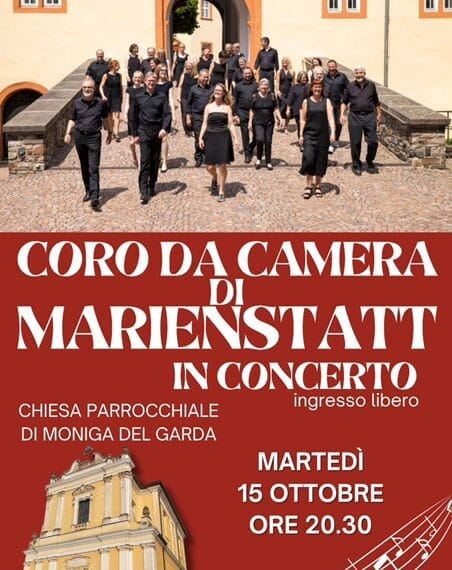On Tuesday, October 15, the San Martino Parish Church in Moniga del Garda hosted a significant musical event featuring the Coro di Marienstatt, a chamber ensemble founded in 1986 at the Cistercian convent in Rhineland. The choir is directed by Veronika Zilles, who led the approximately twenty members through a rich and varied repertoire.
A Repertoire Rich in Emotions
The evening began at 8:30 PM with a selection of pieces that ranged from religious music to folk compositions dedicated to the theme of Peace. The intimate atmosphere was only interrupted by resounding applause at the end of the performances, a testament to the audience’s appreciation. Among the most touching moments of the evening were pieces such as “Oh come mi sento bene la sera,” a canon from the early 1900s, and “Gesù Rex Admirabilis” by Giovanni Pierluigi da Palestrina.
Contemporary and Classical Compositions
The program also included the “Ave Maria” by D. Rubini, arranged for choir and soprano by chorister Antonius Wolf. Another significant piece was “O Salutaris Ostia,” a liturgical chant composed by Marton Levente Horvath, which conversed with “Ascoltaci in paradiso” by contemporary composer Anna Thorvaldsdottir. The latter work reinterprets a 16th-century Icelandic psalm.
Additionally, the choir presented a second version of “O Salutaris Ostia,” reworked by Eriks Esenvalds for two soprano soloists and an eight-voice choir. The evening also featured a moving performance of “Locus Iste” by Anton Bruckner, written in 1869 for the votive chapel of Linz.
Reflections on Peace and Human Fragility
A particularly evocative moment was represented by “Da Pacem” by Estonian composer Arvo Pärt, created in 2004 in response to the terrorist attacks in Madrid. The composition is characterized by its melodic delicacy and tranquil rhythm.
The choir did not limit itself to the classics; it also explored modern works such as “Northern Lights,” also by Esenvalds, inspired by the imagery of the northern lights and legends of fallen soldiers fighting in the celestial spheres. During this piece, a soloist sings in Latvian while other voices narrate the wonders and woes of Arctic explorers.
A Triumphant Finale
The performance concluded with “Alza gli occhi verso le montagne,” from Felix Mendelssohn’s oratorio “Elijah,” followed by “Signore delle cime,” dedicated to the Moniga alpine community and the entire audience present. The evening closed with the performance of “All praise to thee my God this night,” which highlighted the impeccable professionalism of the singers.
The Coro di Marienstatt managed to convey a wide range of emotions through musical interpretations that oscillated between romanticism and modernity, leaving an indelible mark on the hearts of the listeners present in the historic church by Lake Garda.
Italian Version

